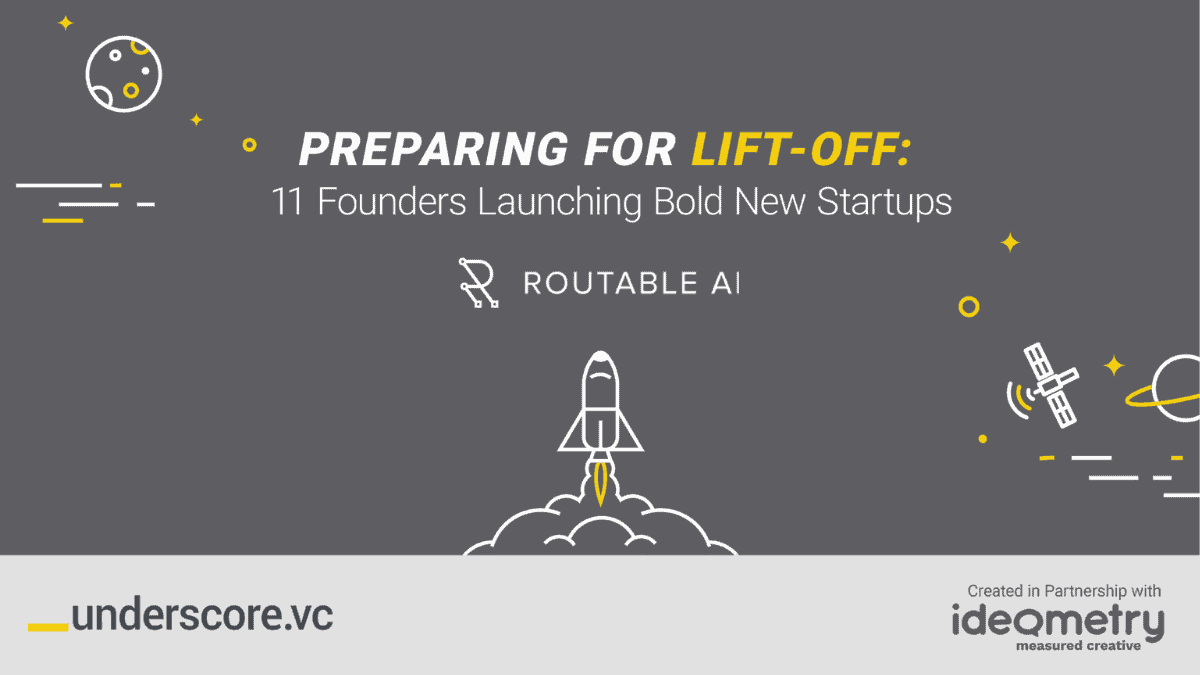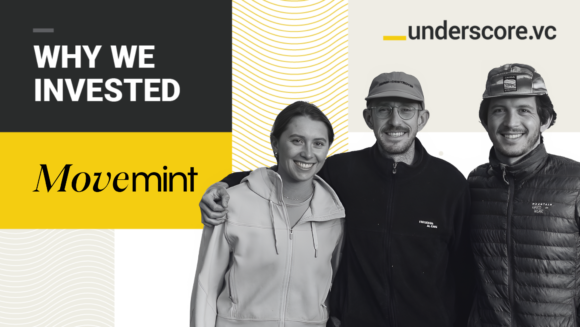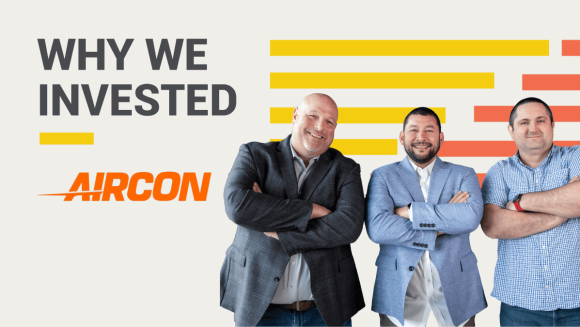These founders are using AI to take ridesharing to the next level. Their research indicates that they could service all of Manhattan’s taxi demands with only ⅕ of the vehicles, a passenger wait time of fewer than 3 minutes and without putting the passengers more than 6 minutes out of their way due to carpooling. Now they’re working to make that vision a reality.
Our new blog series, “Preparing for Lift-Off: 11 Founders Launching Bold New Startups,” features exclusive interviews with the founders from the latest cohort of our UFirst Summer Accelerator program. We’re sharing their stories and the daring ideas that are moving their companies forward. We’re excited to be working with them this summer, and hope you enjoy hearing about their journeys thus far and where they’re headed.
In our final week, meet Menno van der Zee, Alex Wallar, and Jab Sabra the founders of Routable AI, who are revolutionizing ridesharing technology to make transportation more efficient — and more sustainable.

Alex and Menno’s meeting was a global affair: Alex was based in Boston, Menno hailed from Holland, and they united in Singapore to collaborate on an MIT research project, where they instantly discovered a mutual interest in ridesharing technology. The research that followed would go on to lay the groundwork for their burgeoning new startup that’s harnessing AI to pave the way for the future of transportation. They were later joined by Jad who’s earning his MBA at HBS while co-founding Routable AI.
This is part 11 of 11 in our “Preparing for Lift-Off: 11 Founders Launching Bold New Startups” series created in partnership with growth marketing agency Ideometry. Check out Part 10 with Mollie Breen of Breen Technologies.
Watch Routable AI’s pitch at the 2019 UFirst Demo Day Above!
Tell us a bit about Routable AI.
Alex: At Routable AI, we are trying to create a future where private vehicles are no longer needed. We are using proprietary algorithms to make ride sharing more efficient with lower waiting times and higher vehicle occupancy. We want a solution that can automate public transit, connect cities together, and reduce our reliance on private vehicles.
How did you come up with the idea?
Menno: A few years back we were doing research at MIT on how algorithms can dramatically increase the efficiency of ride-sharing by transporting passengers with fewer vehicles. We thought How cool would it be if we could commercialize this technology and make it available for everybody? With the research we developed, we can offer people much cheaper, efficient, and sustainable rides.
At what point did you recognize that you had something you could build a business around, as opposed to just an interesting idea?
Alex: We published an original paper with Professor Daniela Rus and Professor Javiar Alonso-Mora and we got a ton of press coverage. We had this raw idea that this technology could be useful. But it was just a research project at the time. People kept asking for a product.
We didn’t want to leave this paper on the shelf. It was always in the back of our minds that we should develop this technology. Menno shared those same ideas and he had more of a business background from being on the board of YES!Delft, an incubator in the Netherlands.
What does the world look like when Routable AI succeeds?
Menno: We envision a future where you never have to worry about transportation.
Alex: The future that we envision is one of autonomy. People won’t own cars and transportation will not be a commodity. If you look at Original Equipment Manufacturers (OEMs), like Toyotas, Fords, and GM, they’re moving from being automotive manufacturers to mobility companies. They understand that car ownership is on the decline. The future is one where you just hail a ride and that is how you get around when you don’t have public transit. We see an opportunity to work with these OEMs to build out a fleet of vehicles that people will be able to use and share, instead of just own and park.
Ride-sharing companies like Uber and Lyft already have algorithms to optimize their operations. What are they getting wrong? What are you doing that makes your service better than what they have?
Menno: Uber and Lyft have a technology that offers a very simple way of pooling. However, passengers have no idea what time they will arrive. We can guarantee that passengers get to their destinations quickly and efficiently while carpooling. The technology we have is more advanced and much more efficient than what Uber and Lyft are currently using.
Alex: It’s all about ordering and sequencing. If you get ordering wrong, it has a huge impact on delays and waiting times. Being able to quickly iterate through millions of possible trip combinations enables us to find more optimal routes for the fleet.
Can you tell me about the case study you did of Manhattan? What implications does it have for the future of car-sharing services?
Alex: Manhattan is great about providing data for their transportation. It started with a taxi data set that had pickup and drop off times. We were able to simulate how a ride-sharing fleet would operate on those requests. In the case study, we showed that, in Manhattan, we were able to service all of the taxi demands with only ⅕ of the vehicles, a passenger wait time of less than 3 minutes and without putting the passengers more than 6 minutes out of their way due to carpooling. That means that we can have high occupancy ride pooling without the pressures we usually experience when there are additional passengers added to your ride, which increases your overall trip time. Instead of having 15,000 vehicles, you can have 3,000 vehicles and still be quicker and more efficient.
''We showed that we were able to service all of Manhattan's taxi demands with only ⅕ of the vehicles, a passenger wait time of less than 3 mins and without putting the passengers more than 6 mins out of their way due to carpooling'' -… Click To TweetWhat drew you to UFirst? What are you hoping to get out of it?
Alex: We were in contact with Underscore early on. We pitched at a competition an Underscore team member was judging, called the MIT 100K. We were finalists, and we actually ended up later coming in and pitching to Underscore. We didn’t quite yet have our business plan fleshed out, so the team offered us a soft partnership in the form of a spot in the UFirst Accelerator. We saw UFirst as an opportunity to formally work with Underscore and become a part of their network.
Prior to being selected for UFirst, how far along were you in building your start-up?
Menno: The product was, for the most part, finished. We were very familiar with the technology but not with who to sell it to.
Alex: The way I like to put it is: we were like a singer with a beautiful voice but we didn’t have a composer. Nobody wants to pay to hear a beautiful voice if you’re not singing a great song. Underscore came in and helped us triangulate what we were going to do.
What is the expectation at the close of the UFirst program?
Alex: By the end of UFirst we want to start raising our seed round and have multiple pilot programs running with companies and fleets around the world.
Being an entrepreneur, what are some of the biggest challenges you’ve faced along the way?
Menno: One of the first challenges is where to get started. We decided one day that we really wanted to build our technology into a product. Okay, what now? How do you start?
Alex: Both of us are extremely product-focused with software engineering and computer science backgrounds. So, having to prioritize the social side instead of the product side was very difficult. We were never taught how to sell. Learning how to communicate my internal ideas to other people so that they would find them interesting was a challenge.
Starting a business is no easy task. What is the driving force that gets you out of bed every day and motivates you to build your business? What helps you stay focused?
Alex: Whenever I see a parking lot that is full of cars and they’re not moving, just taking up city space — I just get aggravated. I think about how do you make this no longer a necessity. Waking up and trying to solve that with our technology is what I think of every morning.
What’s the most valuable piece of advice you’ve received about being a founder?
Menno: It’s hugely important to talk to a lot of people early on, even if you don’t know what you want to do yet. Just get a feel for what people really need and want. The biggest waste of time is building something that people don’t want.
Ideometry is a Boston-based full-service marketing agency serving a global client base. With a full suite of creative, development, and strategic services, Ideometry helps startups and Fortune 500 companies alike get the business results they’re looking for. If you’re doing something interesting, we’d love to hear from you. Get in touch with us at ideometry.com or email hello@ideometry.com










